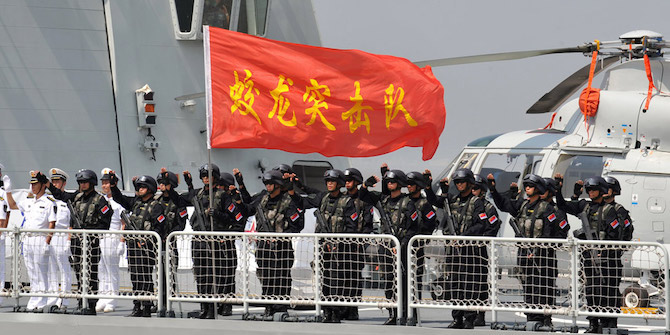by Maryam Al-Kuwari
This memo was presented part of a workshop organised by the LSE Middle East Centre on 13 June 2018, looking at Tribe and State in the Middle East.

The metaphor of the Trojan horse, which originated in Greek mythology, is often referenced in political science. It relates to situations where an enemy is permitted into one’s territory through disguising themselves as something harmless, or at a more complex level, it can be used to describe inviting a unit or a component into a structure or system where it turns out to be a threat to the system’s stability. This blog post asks whether the Trojan horse metaphor applies to tribes and tribalism in the GCC region.
The GCC region has witnessed a wave of tribal revival since the mid-1990s. This wave is illustrated by the rise of tribal identity politics, an increase in the enthusiasm for expressing tribal association and belongingness even among younger citizens, and at times, growing social and political divisions and gaps that are drawn along tribal lines.
There can be no denying that the tribe has constituted a basic historical component of state formation in the modern GCC states. After all, for decades if not centuries, the tribe constituted the organizational unit around which both urban and rural communities converged in the region, particularly in the absence of stable centralized states in the seventeenth, eighteenth and nineteenth centuries. The importance of the tribe in the process of society formation and state building has been studied extensively and the role of the tribe as a driving force in this process has been studied by scholars as diverse as Ibn Khaldun, Karl Marx, Max Weber and others. Anh Longva has even theorized that tribalism was in fact nothing more than a form of nationalism that existed in the era preceding the modern state. Once the state emerged – taking its modern shape and forms – and started carrying out its functions, the tribe naturally took a backseat. It is not surprising, therefore, that tribalism has weakened as the modern state gained strength and expanded its power to reach almost every aspect of modern life.
Even in the GCC context, the 1970s and 1980s witnessed the rise and strengthening of the modern central state while tribalism weakened systematically. This was particularly the case as citizens found more relief, more of their needs met, more of their conflicts resolved, and even their livelihoods depending on the functioning of the modern central state. In contrast, the tribe systematically lost these critical functions and its relevance on the economic, political and even on the social level was significantly weakened.
Interestingly, however, the 1990s witnessed a significant and rapid revival of tribalism, and the tribal unit started to regain much of its relevance, and sometimes much of its political power, although often on the basis of a new understanding of “tribe”. For example, in Kuwait where tribalism became part of the dynamic and conflictual political environment, tribalism emerged on the basis of newly imagined or developed tribal coalitions, gatherings or identities. In fact, in most cases, the revival of tribalism seems to be based on newly imagined pasts and traditions, which could also imply that tribalism is not necessarily an expression of nostalgia for the past in as much as it is a modern phenomenon that has to do with new and present needs or issues.
For example, according to Longva’s theory, this revivalism is a form of return to an erstwhile nationalism, especially at a time when state-based nationalism is weakening and under pressure from globalization. Other theorists, such as Mehran Kamrava, argue that in the case of the GCC, the revival of tribalism is simply the result of failed or absent political reform, where the tribe offers citizens the opportunity to become politically active and involved without directly challenging the authority of the central state or the power and legitimacy of ruling families.
Another controversial theory is proposed by Shafeeq Ghabra who has argued that in the GCC context, the tribe is both the friend and the enemy of the modern state in the Gulf. It is a friend because its loyalty and commitment was critical in reinforcing the legitimacy of ruling families and leading to the establishment of the modern state. On the other hand, it is also a potential enemy because tribal identities are at the root of many social, economic and political conflicts in the region, and whenever the state weakens or fails, tribal identities, divisions or conflicts may emerge to the surface at the expense of the modern state.
The real question, however, is not about the rising or diminishing role of the tribe, but rather, about how Gulf states through their policies, actions, and discourse may be contributing to strengthening or weakening the tribe and with it, tribalism. For example, the state in Kuwait attempted to manipulate tribalism to attain more control and stability, but eventually, the tribes turned against the government and are now seen as a source of instability for the state. Similarly, while the state in Qatar became the central political and economic actor in society, it still recognized the centrality of tribes and encouraged them to maintain their distinct identities, that is, until the tribal factor was used by Saudi Arabia to undermine the Qatari political system by exercising its influence over tribes that shared common ancestry with Saudi tribes.
The relevance of the tribe to the security of the modern states in the GCC hinges on two issues. First, tribes as components can be politically, socially and economically active along strong identities and divisive lines that may in certain circumstances undermine the authority and even the legitimacy of the central state. Secondly, tribes in the GCC context are not limited by nation-state borders, as many of these tribes share common ancestry and lineages with tribes in neighbouring states which may or may not be friendly to their state. Accordingly, as tribalism continues to rise, it is worth asking whether or not tribalism in the GCC could be a possible Trojan horse.
Maryam Al-Kuwari is a PhD candidate in the Institute of Arab and Islamic Studies at University of Exeter. She holds a Masters degree in Middle East Politics from SOAS, University of London. Her PhD thesis is entitled “The Revival of Tribalism in Qatar & Kuwait: A Comparative Study”. She tweets at @MaryamIkuwari
Other posts in this Series:
- Introduction by Courtney Freer
- Tribalism in Middle Eastern States: A Twenty-first Century Anachronism? by Richard Tapper
- Tribe and State in the Contemporary Arabian Peninsula by J. E. Peterson
- The Syrian Civil War: What Role do Tribal Loyalties Play? by Haian Dukhan
- Tribes and Tribalism in a Neoliberal Jordan by Jessica Watkins
- From Revolutions to Elections: When Tribes Transform State Power by Alice Wilson
- The Political Decline and Social Rise of Tribal Identity in the GCC by Steffen Hertog
- On Tribalism and Arabia by Andrew Gardner
- Tribal Modern: Branding New Nations in the Gulf by miriam cooke
- Gulf Nationalism and Invented Traditions by Natalie Koch
- Tribal Social Evolution and Gender: Conflict in Urbanized Tribal Units by Alanoud Alsharekh






